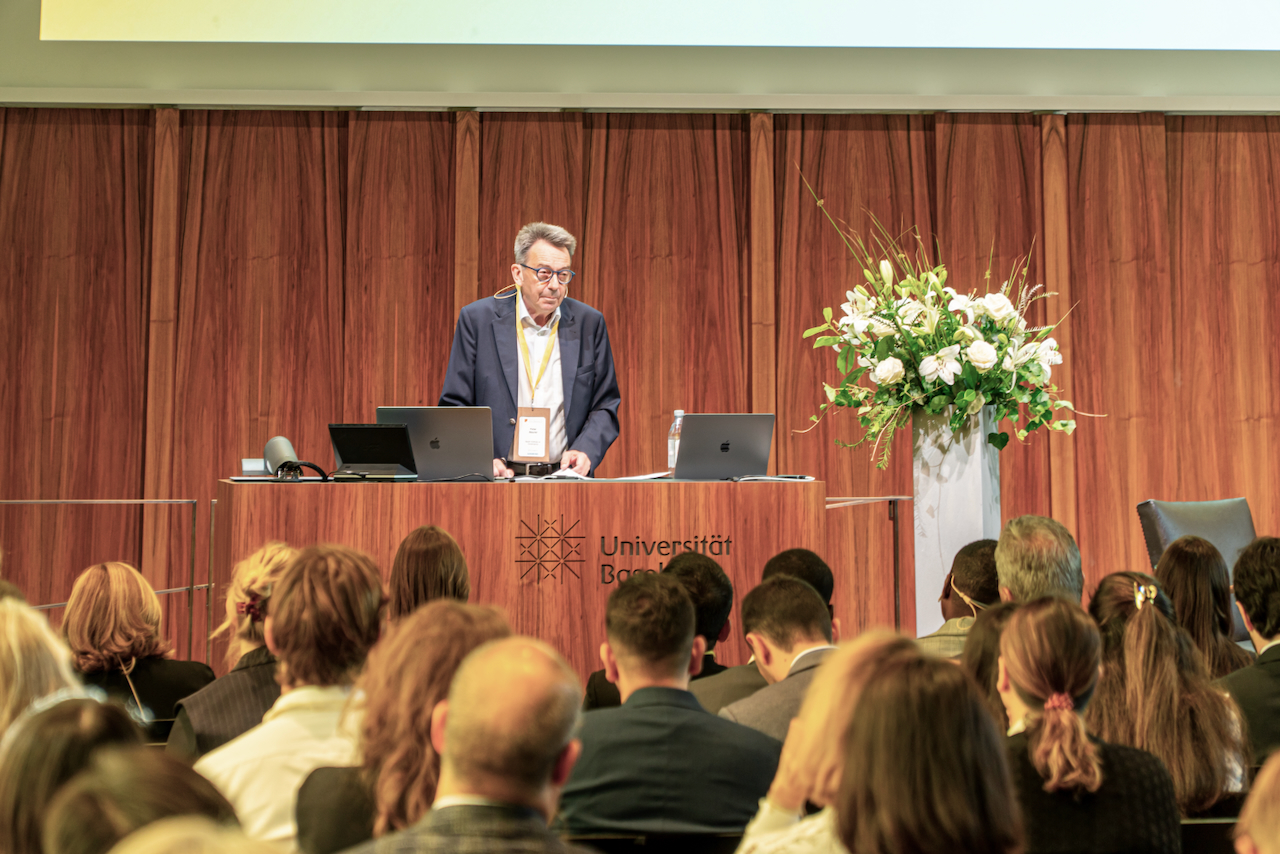The mobilising power of Collective Action: Peter Maurer on new forms of engagement for global solutions

The Basel Institute’s President Peter Maurer opened the 5th International Collective Action Conference on 24 June 2024 with an inspiring keynote speech about global challenges related to corruption and the role of Collective Action in addressing them.
Setting out the current state of affairs, Peter Maurer highlighted disruption, instability and deep transformation of relations between states, international organisations and non-state actors as important factors undermining international consensus, which has been so critical in achieving progress on anti-corruption norms, standards and policies.
Today’s environment is characterised by the deep negative impact of armed conflict, the spread of illegal and illicit economies and state capture, the scarcity and overuse of resources, rapid energy and technological transformation, and stark social inequalities. All these are fuelling feelings of injustice and globalising double standards.
These developments represent the background with which anti-corruption efforts are confronted. Peter Maurer explained subsequently how these challenges are also providing us with opportunities to further progress on anti-corruption. You can watch Peter Maurer's speech here. An edited excerpt follows:
Despite threats to the rules-based order that international organisations have worked to foster globally over the past 80 years, traditional institutions such as the United Nations and OECD have not disappeared. They are, in fact, making notable efforts to adapt to new realities by bringing best practices to the fore and promoting innovative solutions.
Of these, Collective Action and other forms of multi-stakeholder cooperation are proving to be some of the most promising.
Private sector increasingly up to the challenge
For businesses, expectations of regulators, investors, customers, employees and other stakeholders are higher than ever, albeit contradictory at times. Consequently, companies need to equip themselves with the ability to navigate political and social tensions among their stakeholders.
It is therefore positive to see that companies globally are starting to shift from tick-the-box compliance to more refined approaches to strengthening integrity and governance.
Increasingly, they are anchoring integrity challenges at the top of business hierarchies, introducing new measures building on insights from behavioural science, concretising commitments to integrity through Collective Action, and more.
Growing participation in decisions and policies
Another positive trend is how governments and businesses, supported by civil society and academia, are committing to evidence-based decision-making. They are prioritising impactful, people-centred action, and they are implementing systems for achieving integrity in governance.
New technologies are allowing for new forms of research and cooperation. They are also helping to build alliances around particular issues and to facilitate international communities of practice that could not otherwise be sustained.
Finding a balance in the face of dilemmas
While many of us are worried – and rightly so – by simplistic populism, I am impressed every day by the number of actors delicately navigating the big dilemmas inherent to the challenges of anti-corruption work.
They are balancing principles and pragmatism; individual and systemic approaches; legal compliance and the need to create a space for negotiations when implementing norms and standards. They manage to combine respect for professional standards with political advocacy and the desire for transparency with concerns over privacy.
In such an environment, it is particularly important to come together, create a space for debate and support each other in sending a positive signal. And while megatrends may seem unaffected by our efforts, “the God of small things” may be on our side. In other words, lots of small steps forward can together shape deeper and longer-lasting transformation.
Without falling into naïve optimism, it is important to demonstrate that things can be done when we work together. Not necessarily because we are like-minded, but because joining different perspectives in a common framework has a significant potential for impact.
The mobilising force of Collective Action
This is the positive message coming from Collective Action. It’s an action-, cooperation- and future-oriented framework.
At its most effective, Collective Action can help to remind us why we have agreed to certain norms, principles and values – often a long time ago – and show us how to achieve them. It can help to breathe new life into the global rules-based order that is currently at risk.
It can also help to make the world fairer and to reinvigorate international support for democratic institutions, for accountability and for more sophisticated checks and balances.
Collective Action has shifted the balance from an often quite “mechanical” compliance practice to opening a space for agreement on concrete steps forward. It anchors ethical behaviour and compliance with norms in specific contexts and times and around concrete action plans. It is a mobilising force, giving agency to multiple stakeholders.
Why Collective Action has to be a pillar of anti-corruption strategies
From recent discussions on Collective Action and anti-corruption, three important messages stand out for me:
- Corruption is a formidable global challenge that hinders progress on the Sustainable Development Goals, weakens the rule of law, deteriorates public institutions, erodes trust, exacerbates social and economic disparities and compromises peace and security. Re-establishing integrity and trust in institutions as a key path to fighting corruption is critically important.
- If we want our anti-corruption efforts to succeed, we need to create conducive environments. Accountable and rules-based political systems create an enabling environment for anti-corruption work and for countering attacks on open societies.
- To fight corruption we need multifaceted approaches, including actions targeted at promoting transparency and integrity and at reducing impunity. We need to leverage technology, build capacities and expand cooperative agreements between different stakeholders.
Anti-corruption Collective Action has proven its worth in achieving all of those things. That is why Collective Action must be one of the pillars of a more comprehensive, multidisciplinary anti-corruption strategy.
Bringing global perspectives together
As we explore these questions and more, it is useful to remember that integrity will not be a top priority issue if we fail to bring a powerful alliance of stakeholders from all parts of the world around it.
We must not fall into the trap of designing integrity as a neo-colonialist enterprise, where those who have traditionally held power try to impose their normative systems on others. Rather, it is critical to collect best practices from different contexts and learn from each other’s experiences.
There is huge energy and an appetite for change in regions such as Southern Africa, Asia Pacific and Latin America, where regional communities of Collective Action practitioners are beginning to form. And we believe that much of the future expansion and innovation in Collective Action will evolve at these regional levels.
Kicking off the Collective Action Conference
Our aim for the next two days is that together, we – as representatives of governments, businesses, civil society, international organisations and academia – take another step forward in achieving global recognition for Collective Action as an effective tool for rebuilding trust in institutions and democratic norms at a local, national and international level.
The Basel Institute, supported by the Siemens Integrity Initiative, the sponsors of the 5th International Collective Action Conference and of much of our anti-corruption Collective Action work over the last 14 years, would like to thank you very much indeed for your participation.
As ever, we remain open to providing help, advice, connections, and technical assistance to those of you who want to initiate, scale up and further develop Collective Action in your contexts.




